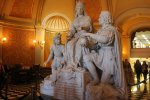
Today is the traditional Columbus Day holiday, which in many places is now being celebrated as Indigenous People’s Day or Native American Day, among other names. For years, Christopher Columbus was celebrated as the person who “discovered” America. The reality is that indigenous people were already settled here long before any Europeans came and Columbus never set foot anywhere on the North American continent. He landed on islands in the Bahamas and explored a bit of the coasts of Central and South America, but never North America. Nevertheless, his voyages opened the door for European colonization of the Americas, so he was considered the one to discover this part of the world from a white Eurocentric view of the world.
His voyages also opened the doors for enslavement of the indigenous peoples and decimation of their population through European diseases. His part in American history is being reconsidered and his legacy is at best problematic. In addition to the problems of disease and his enslavement of other humans, he was accused by his contemporaries of brutal treatment of the native population.
Because of this reassessment of Columbus, some cities and states have started using the traditional holiday as a way to honor Native Americans, who lived on this land long before European settlement and colonization. Statues of Columbus have been removed by some governments and in other cases citizen protestors have forcibly taken them down.
In the last several years, there has been a push to take down statues honoring Confederate leaders who led an insurrection against the United States to protect the institution of slavery. Some governments have voted to remove them and others have again been taken down by citizens. Since the death of George Floyd and the protests against police brutality in the United States, many other Confederate statues and monuments have come down and others, including statues of Union Civil War heroes, Presidents, and other leaders have been toppled or questioned, many of them causing consternation among some members of the majority population.
But those who question why we should honor our founding fathers with statues have reason to question their heroic status. George Washington owned over 300 slaves. Most of the founding fathers were slaveowners. They also created a government in which African-Americans were considered 3/5ths of a person, simply for taxation purposes and voting representation in Congress. They created a nation in which white male landowners held all the power and kept it that way through much of America’s history.
Of course, an argument for continuing to honor them is that they were products of their times, and that is true. But we are products of our times, too, and in our time in the course of history, we don’t believe that slavery is a good thing, we don’t believe that women should have no power, and we don’t believe in honoring those who promoted or supported those beliefs. The same people who argue that monuments honoring historical figures should remain standing because we need them to remember our history were likely the same people who celebrated the toppling of Saddam Hussein’s statue in Baghdad, even though he represented a part of Iraqi history. They were likely the same people who celebrated the destruction of the Berlin Wall or the removal of a statue of Stalin in Budapest during the Hungarian Revolution.
Nothing created by man is permanent and historians and the people are constantly reevaluating history and its heroes. When by modern standards or new politics, those put on pedestals by previous generations are no longer considered heroic, it is likely time to take them down. In some cases they will be replaced with those who more closely resonate with our modern conceptions of what heroes mean, though the likelihood is that at some time in the future, perhaps generations removed, those newer statues will be taken down by even newer thinking.
The problem with monuments is that all of our heroes are human. We all have flaws. While a person may be heroic in one aspect of their life, they may fail miserably in others. Thomas Jefferson was a great thinker and leader of the Revolution, but he also owned slaves. Charles Lindbergh was the first to fly solo across the Atlantic, but he was also an anti-Semitic fascist. Joe Paterno was the winningest coach in NCAA history, but he did nothing to stop an assistant coach from sexually abusing young boys. No person can claim that they have lived a perfect life, that they have not hurt others in some way, whether intentional or not.
The other problem with monuments is that we as human beings cannot always agree on what heroism means. And if we take human heroes out of it and decide to erect only statues honoring great ideals, we also cannot agree on what those are. What is considered an ideal government today may be anathema to tomorrow’s citizens. In addition, what is considered beautiful art by one may be reviled by others. Who gets to decide who is honored and how? The majority? And what happens when they become the minority?
Perhaps the answer is that we should not erect public statues and monuments at all, though it seems as as though it is in our nature to do so. If it is something we feel compelled to do, perhaps we have to work our way to an agreement about who or what deserves honor at the moment. Maybe we can keep some that honor great contributions, but that are problematic, but can also add plaques that give some more context to who they were. Maybe we should agree that it is simply okay for us to remove the monuments which we deem as not aligning with our current agreed upon values, such as statues of Columbus, and then erect monuments which honor our beliefs and morals at this time. Future generations can decide if our choices were right for them.
